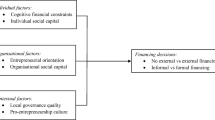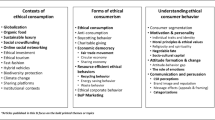Abstract
The most direct way in which consumer research can deal with the collection of techniques used for seeking out information and for making choices is by recognizing that, since these techniques give services over time, they are a form of capital. To the extent that time and resources are used in a deliberate manner to create this capital, the process of accumulation can be viewed as investment in consumer search capital (CSK). The paper identifies the conditions under which investment in private CSK and collective CSK can be justified, and examines some of the situations where the insight provided by this approach is especially useful.
The consumer association is chosen as one particular form in which collective CSK is embodied in order to illustrate the usefulness of the CSK approach. It was found that such collective CSK can have small but truly significant effects, not only on the pace but also on the character of progress in developing countries, a finding which may be especially significant to those with low incomes. Among the types of activities of consumers' associations might undertake, “framework pressure” (to achieve fairer rules of exchange, among other things) and ex ante uses of this collective CSK appear to be superior to other alternatives discussed. It is argued that the method has much potential for examining other forms in which CSK is embodied and that the approach suggests additional hypotheses of research interest.
Zusammenfassung
Zu den Techniken der Informationssuche und Entscheidungsfindung hat die Verbraucherforschung dann einen unmittelbaren Zugang, wenn diese Techniken als eine Form von Kapital aufgefaßt werden, dessen Nutzen sich über die Zeit verteilt realisiert. Dieses Kapital wird im vorliegenden Beitrag als consumer search capital (CSK) bezeichnet. Wenn Zeit, Geld und Mühen dafür aufgewendet werden, solches Kapital zu bilden, so läßt sich der Akkumulationsprozeß als Investition in das CSK auffassen. Der Beitrag zeigt die Bedingungen auf, unter denen Investitionen in privates und kollektives CSK gerechtfertigt sind, und untersucht einige Situationen, für die dieser Ansatz besonders nützlich erscheint.
Als Beispiel dafür, wie kollektives CSK konkret aussehen kann, wird die Verbraucherorganisation gewählt. Es zeigt sich, daß kollektives CSK nachweislich einen Einfluß auf die Geschwindigkeit und auf die Richtung des wirtschaftlichen Fortschritts in Entwicklungsländern haben kann. Allerdings ist dieser Einfluß nicht sehr hoch. Er kann aber besonders für Gruppen mit sehr niedrigem Einkommen von Bedeutung sein. Unter allen möglichen Aktivitäten, die von Verbraucherorganisationen ausgehen können, dürfte den Anstrengungen zur Verbesserung der Rahmenbedingungen (z. B. bessere Markt- und Wettbewerbsbedingungen) und der ex-ante-Anwendung des kollektiven CSK die größte Bedeutung zukommen.
Abschließend wird herausgestellt, daß der Ansatz auch für andere Formen fruchtbar gemacht werden kann, in denen sich CSK realisiert, und daß er weiterführende Hypothesen für die Verbraucherforschung erbringt.
Similar content being viewed by others
References
Becker, G. (1965). A theory of the allocation of time. Economic Journal, 75, 493–517.
Benedicto, J. C. (1978). A Philippean project on consumer education in food and nutrition in a rural community through the Barangay Scholar in Nutrition program. Paper presented to the IOCU Regional Seminar on Consumer Education in Food and Nutrition, January 8–11. Quezon City, The Philippines: Kilusan Ng Mga Mamimili Ng Pilipinas Ink.
Best, A., & Andreasen, A. R. (1976). Talking back to business: Voiced and unvoiced consumer complaints. Washington, D. C.: Center for the Study of Responsive Law.
Canada (1968). Special Committee of the House of Commons on Drug Costs and Prices. Hansard, February 12, p. 8.
Cas, G. (1976). Les techniques de protection du consommateur en régime occidental. Revue d'études comparatives est-ouest, 7, 161–185.
Crowley, M. (1977). Consumer education and developing countries. In: Final report of the KMPI seminar-workshop on consumer education, pp. 42–44. Quezon City. The Philippines: Kilusan Ng Mga Mamimili Ng Pilipinas Ink.
Hirschman, A. O. (1970). Exit, voice, and loyalty: Responses to decline in firms, organizations, and states. Cambridge, Mass.: Harvard University Press.
Hollensteiner, M. R. (1978). Social realities for consumer education in action — an outline. Asia/Pacific Consumer: Regional IOCU Office Newsletter, No. 16, pp. 5–7.
ILO (1973). Study guide on consumer protection: A new field of international concern. Geneva: The International Labour Office.
IOCU (1978?). Information sheets published by the Regional IOCU Office. Penang: IOCU Regional Office for Asia and the Pacific.
Kerton, R. R. (1980). World food problems: Exit or voice? Waterloo, Ontario: University of Waterloo. Working paper, University of Waterloo Economics Series.
Kumar, S. (1973). Creating and protecting the Asian consumer. International Consumer, 4 (1), 15–18.
Marshall, A. (1920). Principles of economics (8th ed.). London: Macmillan.
Maynes, E. S. (1979a). Consumer protection: The issues. Journal of Consumer Policy, 3, 97–109.
Maynes, E. S. (1979b). Consumer protection: Corrective measures. Journal of Consumer Policy, 3, 191–212.
McClelland, D. C. (1961). The achieving society. Princeton: Van Nostrand.
Montiel, C. (1977). Malpractices faced by the metro Manila low-income consumer: A pilot study with implications for consumer education. In: Final report of the KMPI seminar-workshop on consumer education, pp. 30–41. Quezon City, The Philippines: Kilusan Ng Mga Mamimili Ng Pilipinas Ink.
Padberg, D. I. (1977). Non-use benefits of mandatory consumer information programs. Journal of Consumer Policy, 1, 5–14.
Rajaratnam, A. (1976). Asia and the Pacific. International Consumer, 16, 25–27.
Sai, F. T. (1977). Health, nutrition, and population in human settlements. London: International Planned Parenthood Federation.
Simoons-Vermeer, R. (1978a). Consumer organisations in Asia and the Pacific — A survey. The Hague: International Organisation of Consumers Unions.
Simoons-Vermeer, R. (1978b). Go and tell everyone. Penang: IOCU Regional Office for Asia and the Pacific.
Simoons-Vermeer, R. (1978c). Contribution to workshop on low-income consumers. Paper prepared for the 9th IOCU World Congress, London, July.
Steckle, J. (1972). Effects of industrialization on food consumption patterns. Legon, Ghana: Institute of Statistical, Social, and Economic Research. Technical Publication Series (No. 20).
Stigler, G. J. (1961). The economics of information. Journal of Political Economy, 69, 213–225.
Stigler, G. J. (1962). Information in the labour market. Journal of Political Economy, 70, 94–105.
Szal, R. (1979). Popular participation, employment, and the fulfillment of basic needs. International Labour Review, 118, 27–38.
Thorelli, H. B., & Thorelli, S. V. (1977). Consumer information systems and consumer policy. Cambridge, Mass.: Ballinger.
United Nations, Economic and Social Council (1978). Consumer protection: A survey of institutional arrangements and legal measures. Report of the Secretary-General, E/1978/81, June 8.
Van Rijckeghem, W. (1976). IOCU in 1975–76. International Consumer, 16, 1–3.
Additional information
Robert R. Kerton is Associate Professor in the Department of Economics at the University of Waterloo, Waterloo, Ontario, Canada, N2L 3G1. Gratitude is expressed for help provided by Jarmille Lentik, R. Simoons-Vermeer, and A. Wendt. Diligent reviews by W. van Ginneken and K.M.H. Bennett have resulted in substantial improvements, as have specific suggestions by M. Leonor, W. van Rijckeghem, and conscientious reviewers. Several persons at the International Organisation of Consumers Unions in The Hague and in Penang have been most helpful. Thanks are also expressed to the Income Distribution and International Employment Policies Branch of the International Labour Office in Geneva for hosting the author during 1978–79 when this work was begun.
Rights and permissions
About this article
Cite this article
Kerton, R.R. Consumer search capital. Delineating a concept and applying it to consumers in developing countries. J Consum Policy 4, 293–305 (1980). https://doi.org/10.1007/BF00380566
Issue Date:
DOI: https://doi.org/10.1007/BF00380566




